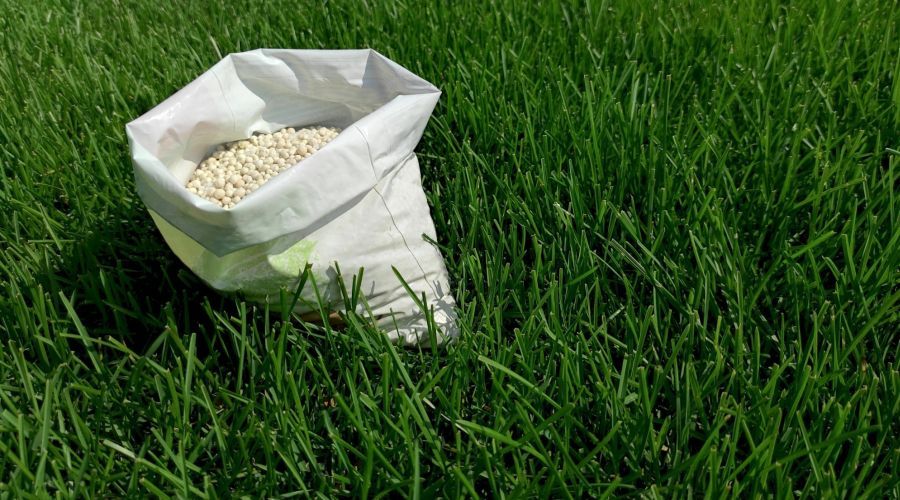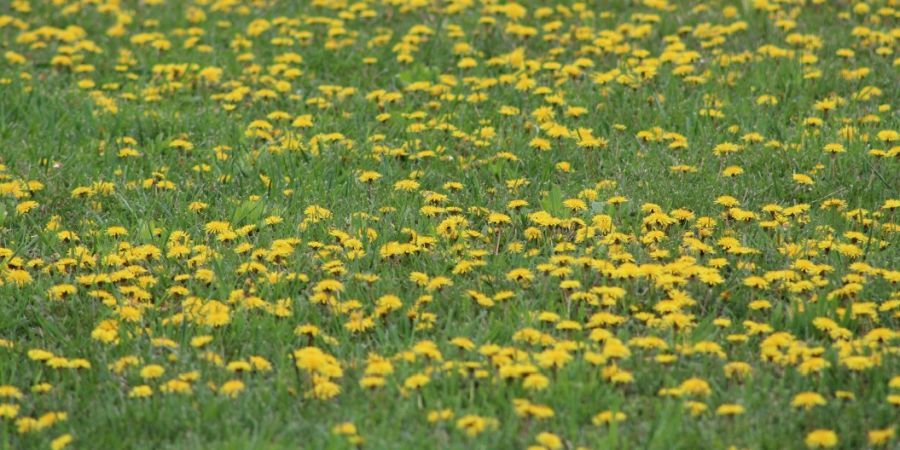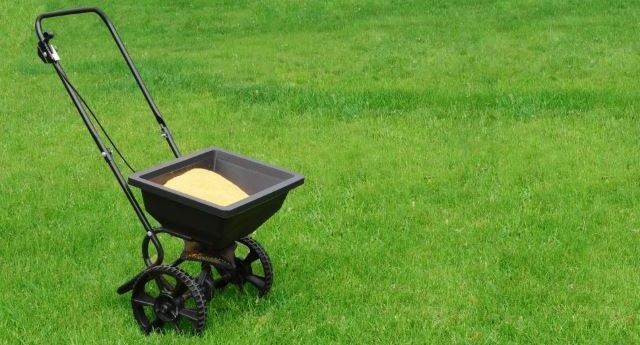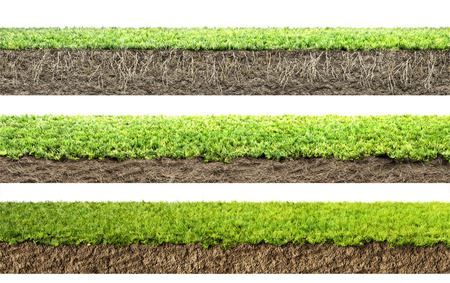You love your lawn. Unfortunately, weeds do, too.
Instead of spending an entire day doing the grueling work of pulling weeds from your lawn, pull out a fertilizer with weed control and get the job done in minutes. Simply apply it to your lawn, wait a couple of weeks, and the weeds will be gone.
The added bonus is that while it eliminates weeds, your weed and feed fertilizer will nourish your grass, strengthening its roots and providing it with much-needed nutrients. To help you weed through all of the weed and feed fertilizers available in 2021, this comprehensive guide includes in-depth reviews on the absolute best weed and feed fertilizers on the market.
Backyard Boss Top 5 Fertilizers With Weed Control for Summer 2021
|
PRODUCT |
FEATURES |
||
|---|---|---|---|
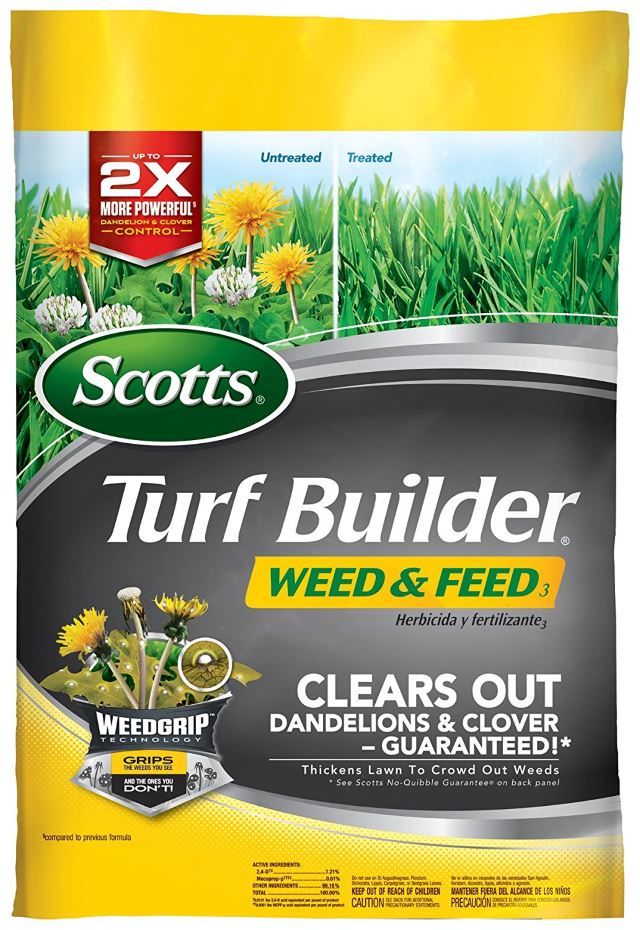
|
|
||
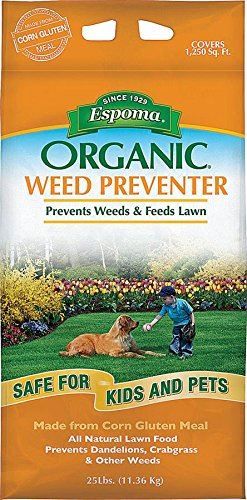
|
|
||
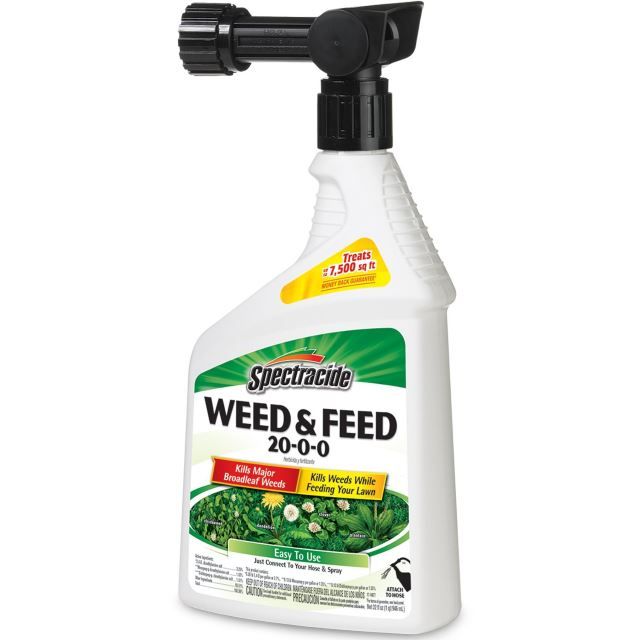
|
|
||
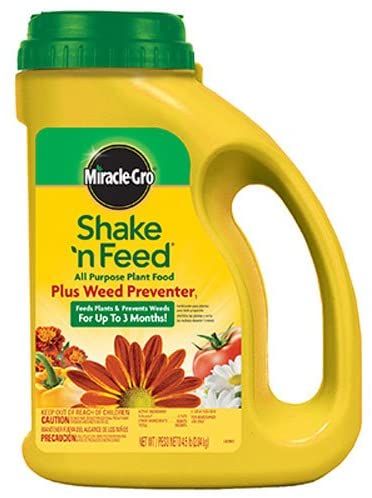
|
Miracel-Gro Shake 'N Feed All Purpose Plant Food Plus Weed Preventer |
|
|
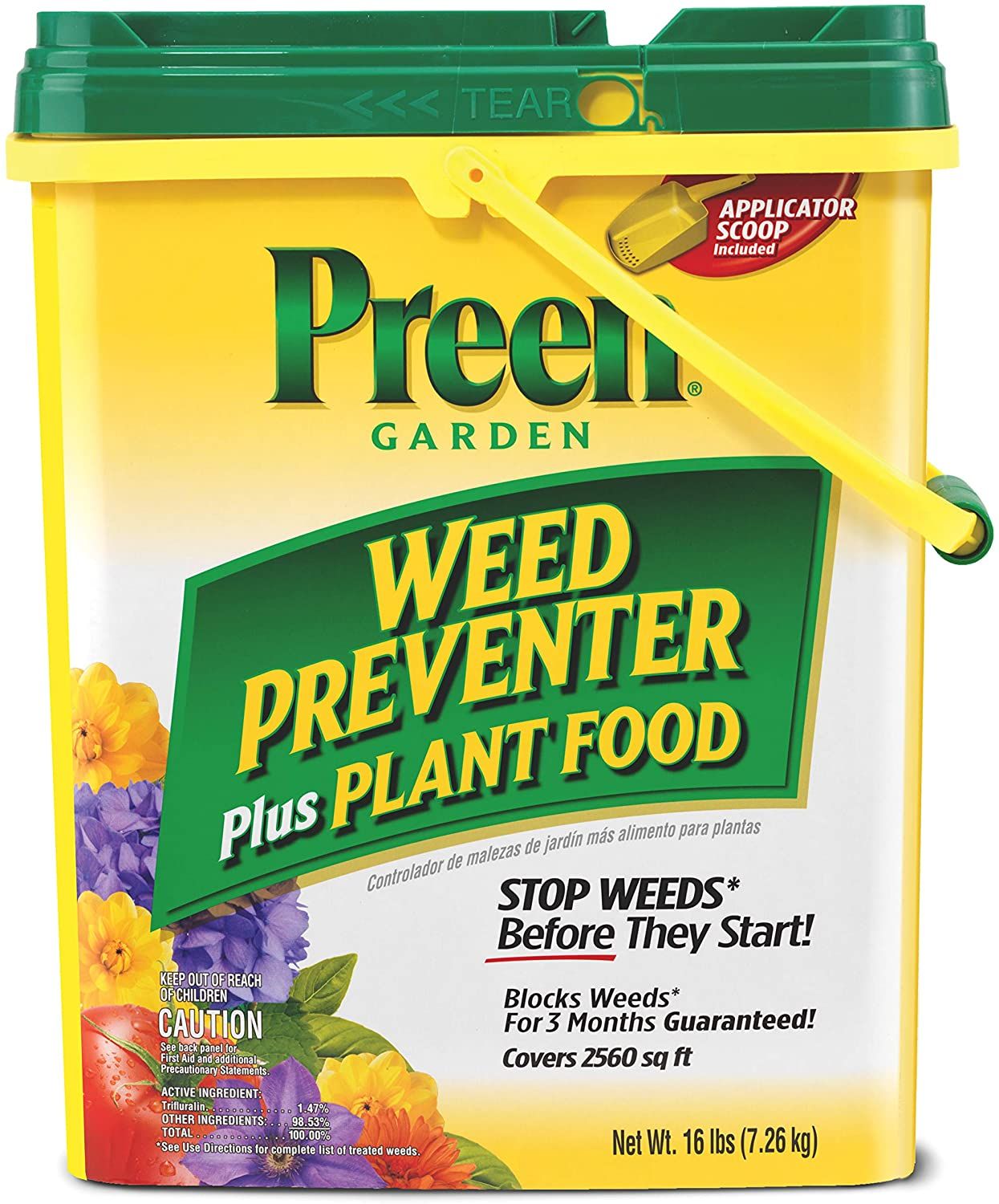
|
|
Why You Can Trust Us
If you have questions about your home or lawn, Backyard Boss has answers. Our dedicated team is passionate about proper lawn care, publishing countless guides on the subject. Whether you're looking for the best lawn fertilizers, need help finding the best sprinklers for large areas, want to know about the best cheap lawn mowers, or are in search of the best grass seed, we have a guide for you.
When you consult Backyard Boss you're getting answers from the best about the best products available. For every guide we write, we conduct countless hours of research, weeding through all of the industry's top-rated products to deliver you in-depth, informative reviews and buyer tips.
Become a Backyard Boss by using our helpful guides to make your lawn look better than ever.
Best Budget Option
This excellent weed and feed fertilizer makes quick work of dandelions and clovers while nourishing your grass.
- Inexpensive
- Usable on many grass types
- Easy to apply
- Harmful to people and pets in first 24 hours
|
|
Why We Like It: Scotts Turf Builder is one of the most recognized brands in fertilizer, and this excellent weed and feed fertilizer is no exception.
Although it's fairly inexpensive, it's incredibly effective, eliminating pesky dandelions and clovers while it provides necessary nutrients to your grass. This formula is one of the strongest ones that Scotts Turf Builder sells, so weeds don't stand a chance. It works on a handful of grass types so it's versatile, but you should still check to make sure that it's right for your grass so you get the best results.
Who Should Buy It: This hassle-free fertilizer is perfect for people who want something they can easily apply to their entire lawn.
Best Organic Option
If you’re looking for an organic fertilizer that annihilates weeds, this is one of the best options on the market.
- Easy to dispense
- Organic product
- Prevents weeds
- May have to use more than other brands
- Takes a while to work
|
|
Why We Like It: Balancing the safety and effectiveness of organic fertilizers with the ability to prevent weeds, this weed and feed fertilizer is an excellent option.
Made with all-natural and organic ingredients, this organic weed preventer is completely safe to use on your property. It's easy to use, though perhaps not as easy as using a push spreader. Simply apply it to your yard twice a year to keep weeds from growing.
Who Should Buy It: If you already have weeds, this isn't the fertilizer for you because it only prevents weeds. However, if you want an organic fertilizer that can prevent weeds from popping up, this is an excellent option.
Best for Hassle-Free Fertilizing
This easy to use weed and feed fertilizer is an excellent affordable option with long lasting results.
- Inexpensive
- Long lasting
- Easy application
- Hazardous to people and pets
|
|
Why We Like It: While this weed and feed fertilizer has a low cost, it reaps big results.
It's extremely easy to use. Simply attach this liquid fertilizer to your hose for easy distribution over your entire yard. With the capabilities to knock out an impressive amount of weeds, this liquid weed and feed is an excellent purchase.
Who Should Buy It: If you are looking for an easy to use liquid weed and feed fertilizer this is one of the most hassle-free options available.
Best Granular Fertilizer
Perfect for your lawn and garden, this weed and feed fertilizer aids healthy plant growth while preventing weeds.
- Easy to use
- Nourishes plants
- Prevents weeds
- Too much will burn plants
|
|
Why We Like It: This granular weed and feed fertilizer stops weeds while nourishing your plants.
Simply apply this product to your lawn or garden in the early spring at the beginning of the growing season and it will prevent weeds for up to three months. This 4.5-pound jug can treat over 135 square feet of space, which makes it better for garden beds than lawns. It will provide plants with lots of necessary nutrients and has a well-balanced 12-4-8 NPK value.
Who Should Buy It: This is the perfect weed and feed fertilizer for people who want to protect their gardens from annoying weeds.
Best for Preventing Weeds and Fertilizing
This balanced plant food gets rid of weeds while helping plants and grass develop roots.
- Eliminates weeds
- Balanced fertilizer
- Aids plant root development
- Expensive
|
|
Why We Like It: You can use this granular weed preventer and fertilizer all season long to feed your plants and prevent weeds from sprouting.
It can be used during the spring, summer, or fall on garden beds, around trees, shrubs, or any other plants. The nutrients in it encourage healthy, speedy plant growth without being so overwhelming that you risk burning your plants. Although its price is high, it can cover up to 2,560 square feet of space.
Who Should Buy It: If you want your garden beds to stay weed-free and healthy all year long, try this granular weed and feed fertilizer.
Why Use Fertilizer With Weed Preventer?
Fertilizer provides plants with the nutrients, minerals, and vitamins they are lacking, enabling them to grow faster, healthier, and bigger. With fertilizer, you can fill any nutrient deficiencies your plants may have, not only helping them survive but also thrive.
When you use a fertilizer that not only provides your plants with nutrients but also kills off and prevents weed growth around them, you are aiding their health in two ways. Weeds can strangle plants and encroach on their space, stunting and inhibiting their growth.
What Is in Fertilizer?
You know fertilizer is good for your plants. But do you know why? What's in it that helps plants grow?
Most lawn fertilizers contain nitrogen, phosphorus, and potassium, all agents that aid plant health. Nitrogen helps plants grow and makes them look extra green. Phosphorus helps out with the growth of roots and any fruit, seeds, or flowers the plant produces. Potassium aids root growth and protects plants from drought and diseases.
To find out how much of each of these nutrients are in fertilizers, look up their NPK value. NPK stands for nitrogen, phosphorous, and potassium's element symbols. The value is shown as x-x-x, with each number representing a percentage of the whole.
For instance, a 20-pound bag of fertilizer with an NPK value of 15-5-6 would be made up of 15 percent nitrogen, five percent phosphorus, and six percent potassium. So that 20 pound bag would include three pounds of nitrogen, one pound of phosphorus, and 1.2 pounds of potassium.
The rest of the bag is normally occupied by secondary nutrients and filler that ensures the nutrients are properly distributed.
When Should You Fertilize?
The best time to fertilize is in the early spring, especially if the fertilizer you're using is also a weed preventer. If you use a weed preventer during the spring season, instead of right before it, then it will probably be too late for it to actually prevent weeds from popping up.
Before you fertilize though, it's a good idea to conduct a soil test. Soil tests reveal what nutrients your yard and garden are missing so you can make an informed fertilizer purchasing decision to address those deficiencies.
Finding Soil Deficiencies With a Soil Test
Soil tests not only determine which of the primary nutrients, nitrogen, phosphorus, and potassium, your soil is missing. They also determine if there are any deficiencies in oxygen, carbon, calcium, magnesium, boron, cobalt, iron, manganese, and other secondary nutrients.
You can purchase a soil test to run for yourself at home or you can take a sample of your soil to a cooperative extension testing office if there is one in your area. Either way, you'll be able to find out what you need.
If you're interested in doing a soil test, check out the video below for more guidance!
The Types of Fertilizer
As you've probably gathered, fertilizers come in many different forms and types. There are liquid fertilizers, granular fertilizers, and plant food spikes. There are also synthetic and organic products. Below are descriptions of all of the most popular kinds of fertilizers so you can determine which one is right for you.
Fertilizer Forms: Liquid, Granular, and Spikes
Liquid Fertilizer
Liquid fertilizers are very convenient to use, especially if they come with a neat hose attachment which can be placed on the end of your hose so you can easily and efficiently spray them around.
If they don't, you normally need to mix with water to dilute them before pouring them onto plants. Liquid fertilizers tend to be inexpensive, but they can have a high risk of burning plants if you're not careful when applying them.
Granular Fertilizer
There are two types of granular fertilizers: quick-release and slow-release granules. Quick-release granules break down quickly, imparting their nutrients into the soil once they are hit with water. They typically need to be spread about once a month.
Slow-release granules break down slowly, imparting their nutrients on the soil over time. If they are coated with sulfur they'll take two months to break down, while if they are coated with a polymer, their slow-releasing formula may take as long as four months to fully break down.
To spread granular fertilizers evenly around, you normally need to use special equipment. Some granular fertilizers come in special containers now so you can easily shake them out around your yard.
If yours doesn't come in a special container it's recommended you use a mechanical broadcast spreader, which can be handheld, or a cart. Mechanical spreaders spin and launch the fertilizer all over the place, making sure the yard is completely covered.
Plant Food Spike
Plant food spikes are less common than liquid and granular fertilizers but they are still effective. They are a spike that's made of nutrients that you stab into the ground.
Their nutrients break down slowly over time and are absorbed by the surrounding plant life. These are great for indoor plants, trees, and shrubs.
Fertilizer Types: Organic and Synthetic
Organic Fertilizer
Organic fertilizers are normally slow-release, gradually producing results since they have no artificial ingredients to speed up the release. They are made with natural ingredients like kelp, alfalfa, seaweed, and blood meal.
If you're worried about fertilizer safety, then organic fertilizers are an excellent choice since they are gentler than synthetic fertilizers, and therefore much better for households with children and pets. They are also way more eco-friendly than synthetic fertilizers because they don't release harmful chemicals into water runoff.
Synthetic Fertilizer
Synthetic fertilizers tend to be the most popular fertilizer options, especially in the weed and feed fertilizer industry. They work quickly, are easy to apply, and are inexpensive. They even are able to provide an exact ratio of nutrients so you know specifically how they'll impact your lawn.
However, they are way less safe than organic fertilizers, especially if you have children and pets, so you have to be much more careful with them. Also, many of them are environmentally hazardous.
Factors to Consider When Choosing a Fertilizer
Now that you've narrowed down what type of fertilizer you want, you need to consider other factors like your house's grass and plants, the type of weeds you are battling, and application instructions before purchasing a weed and feed fertilizer.
Grass/Plant Type
Different fertilizers will benefit different types of plants and grass so make sure that the fertilizer you choose is compatible with the plants you are using it for. Yes, not all grasses require the same nutrients. In fact, from grass type to grass type their needs can be dramatically different.
There are fertilizers that benefit new grass or established grass and every specific grass type under the sun including St. Augustine, Dichonda, Lippia, Carpetgrass, Bermuda Grass, or Bentgrass.
Generally, you can choose a one-size-fits-all type of fertilizer, but your results won't be as good as with something specific for your type of turf. You also need to be mindful of the area in which you live. If you have a southern lawn you'll need a much different fertilizer than northerners because you don't have to prepare for the same level of freeze.
Weed Type
Just like you should keep your plant and grass type in mind when buying a fertilizer, you should also make sure that the weed and feed fertilizer you buy is capable of combatting your specific type of weeds. Some are geared more towards clovers and dandelions, while others are crabgrass preventers or work best on broadleaf weeds.
Application Instructions
Your specific fertilizer will have application instructions on how to spread it, how much to use, and how frequently to use it. Obviously, these are pretty important bits of information, so take the time to read the small print so you know how to use the fertilizer, and if it has an application process that suits your preferences.
How We Picked
There is not a small selection of weed and feed fertilizers available in 2021, however, our dedicated team weeded through them all to find these five exceptional products.
We looked for weed and feed fertilizers that would suit a variety of purposes. Because of this, we picked some options that eliminate existing weeds and some that would prevent weeds.
We also looked for synthetic and organic products, premium and affordable options, and granular and liquid fertilizers so there were plenty of options for everyone, no matter their preferences.
Every weed and feed fertilizer we chose is fully capable of nourishing plants while simultaneously taking on pesky, annoying weeds. These are the best of the best, but only one can be the absolute champion.
Which Weed Control Fertilizer Should You Pick?
For pure ease of application and effectiveness, my vote has to go to the Spectracide Weed & Feed. With no need for any additional tools, aside from a garden hose, and with the ability to kill off a very large number of weeds while still feeding your grass, this is a great product.
However, with its NPK value showing it pretty much only provides nitrogen to your yard, other products may be better for your situation. Every weed and feed fertilizer on this list is a winner so if another calls to you more go for it!

